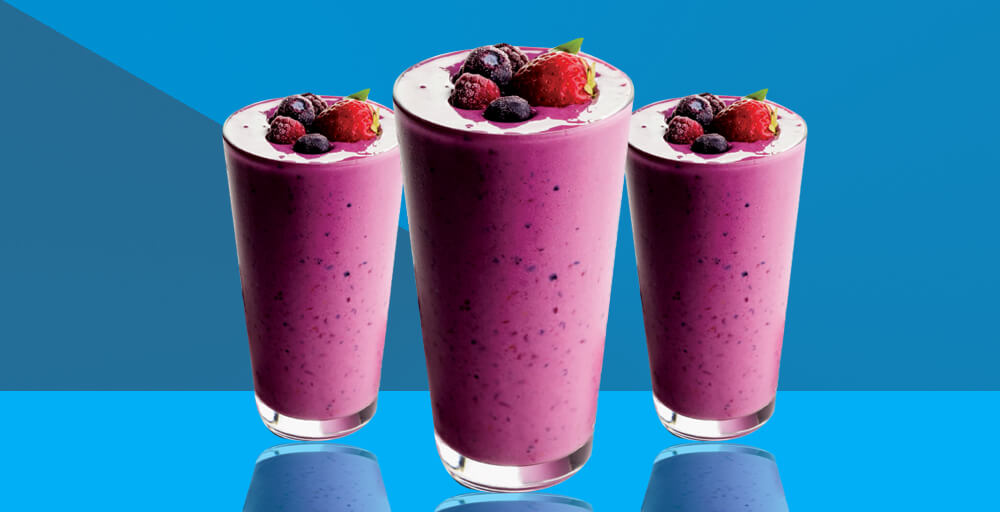Delight your taste buds with our collection of delightful fruit smoothie recipes with milk. Enhance your daily routine by blending fresh fruits with creamy milk, creating a symphony of flavors and nutrients. From classic banana-berry blends to exotic tropical blends, our recipes cater to all taste preferences. Rich in vitamins, antioxidants, and the creaminess of milk, these smoothies are a healthy snack for any time of day. Whether you’re a health enthusiast or just want a refreshing sip, discover the perfect balance of taste and health in our curated selection of fruit smoothie recipes with milk.
5 Super Easy Fruit Smoothie Recipes with Milk
Here are some easy recipes that can be made without any hassle.
1. Banana Berry Bliss: (2 minutes)
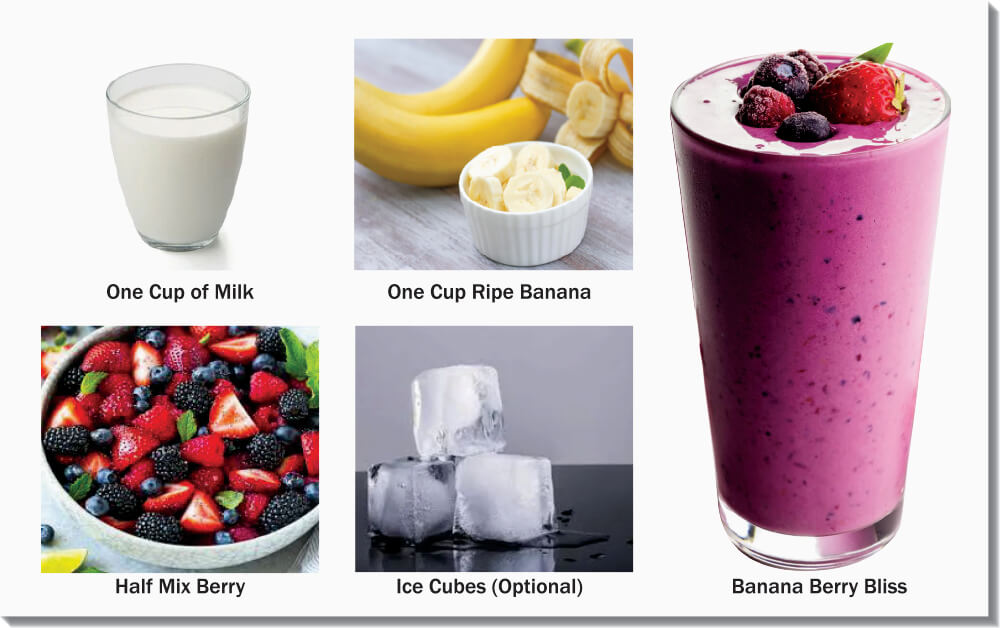
Ingredients:
- 1 ripe banana
- 1/2 cup mixed berries (strawberries, blueberries, raspberries)
- 1 cup of milk
- Ice cubes (optional)
Instructions:
Blend all ingredients until smooth. Enjoy a creamy and antioxidant-rich delight!
Nutritional value of ingredients
| Ripe Banana: | Mixed Berries (1/2 cup: strawberries, blueberries, raspberries): | Milk (1 cup): | Ice cubes (optional): |
| Calories: 105 | Calories: 30 | Calories: 80–100 | Essentially, ice cubes contribute negligible nutritional value, as they are primarily water. |
| Carbohydrates: 27g | Carbohydrates: 7g | Carbohydrates: 12g | |
| Fiber: 3g | Fiber: 3g | Fat: 2–8 g | |
| Sugars: 14g | Sugars: 4g | Protein: 8g | |
| Vitamin C: 10% of the Recommended Daily Allowance (RDA | Vitamin C: 25% of the RDA | Calcium: 300mg | |
| Potassium: 450mg | |||
2. Tropical Mango Tango: (2 minutes)
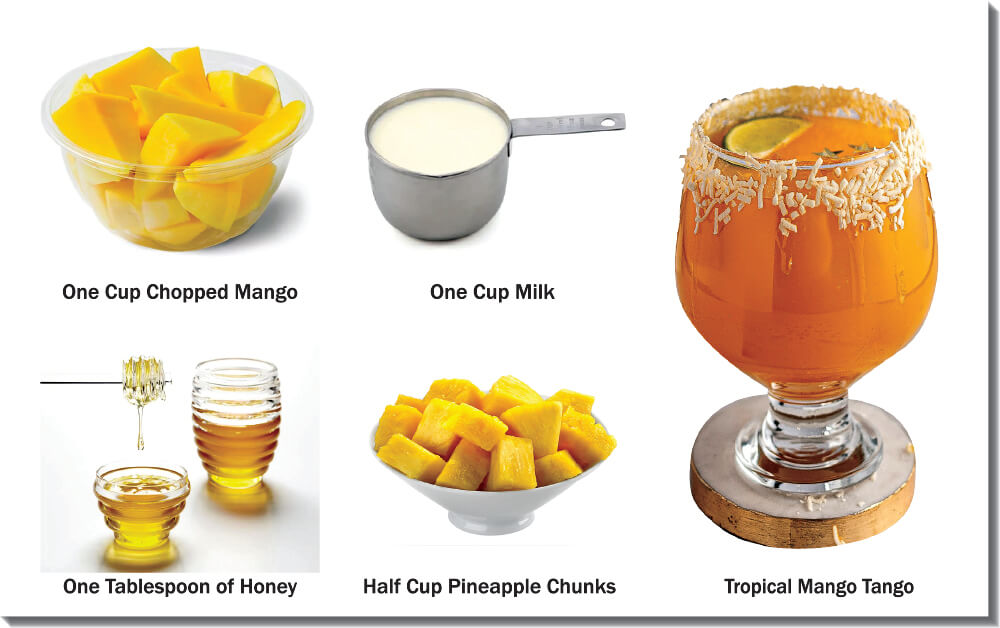
Ingredients:
- 1 cup chopped mango
- 1/2 cup pineapple chunks
- 1 cup of milk
- 1 tablespoon of honey
Instructions:
Blend until creamy. Sip on this tropical paradise for a burst of vitamin C.
Nutritional value of ingredients
| Chopped mango (1 cup): | Pineapple Chunks (1/2 cup): | Milk (1 cup): | Honey (1 tablespoon): |
| Calories: 60 | Calories: 40 | Calories: 80–100 | Calories: 64 |
| Carbohydrates: 15g | Carbohydrates: 10g | Carbohydrates: 12g | Carbohydrates: 17g |
| Fiber: 1.5g | Fiber: 1g | Protein: 8g | Sugars: 17g |
| Sugars: 14g | Sugars: 7g | Fat: 2–8 g | |
| Vitamin C: 60mg | Vitamin C: 20mg | Calcium: 300mg |
3. Berry Spinach Surprise Smoothie: (2 minutes)
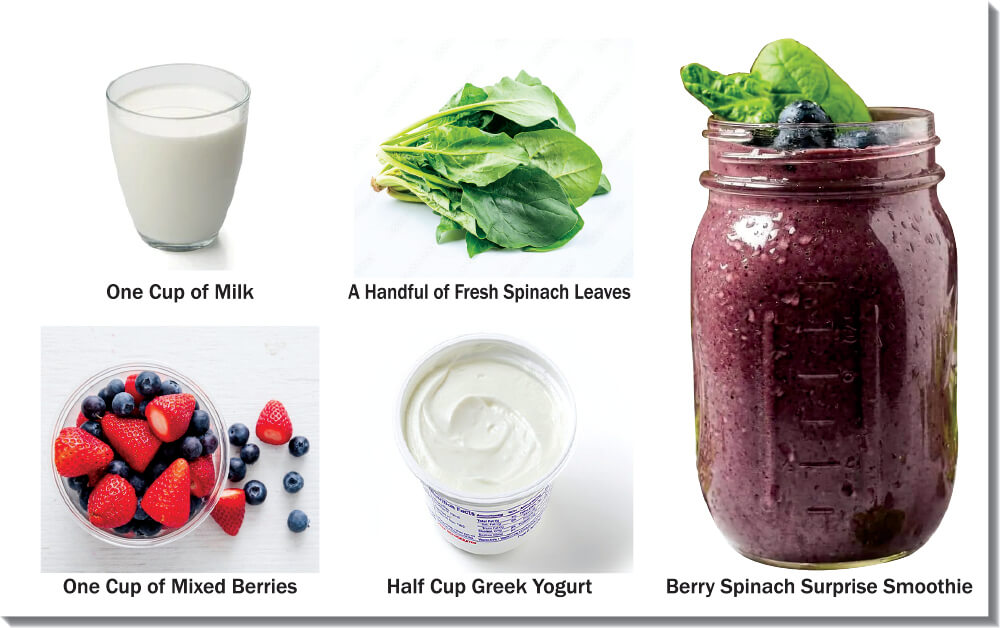
Ingredients:
- 1 cup of mixed berries
- A handful of fresh spinach leaves
- 1/2 cup Greek yogurt
- 1 cup of milk
Instructions:
Blend until vibrant green, and enjoy a nutrient-packed smoothie.
Nutritional value of ingredients
| Mixed Berries (1 cup): | Fresh spinach leaves (handful): | Greek Yogurt (1/2 cup): | Milk (1 cup): |
| Calories: 50 | Calories: 7 | Calories: 80–100 | Calories: 80–100 |
| Carbohydrates: 12g | Carbohydrates: 1g | Protein: 12g | Protein: 8g |
| Fiber: 4g | Fiber: 1g | Carbohydrates: 6g | Carbohydrates: 12g |
| Sugars: 7g | Protein: 1g | Fat: 4-5g | Fat: 2–8 g |
| Vitamin C: 25% of the Recommended Daily Allowance (RDA) | Vitamins and Minerals: Rich in vitamins A, C, K, and folate; good source of iron and calcium | Probiotics are beneficial for gut health. | Calcium: 300mg |
4. Peachy Keen Protein Boost Smoothies: (2 minutes)
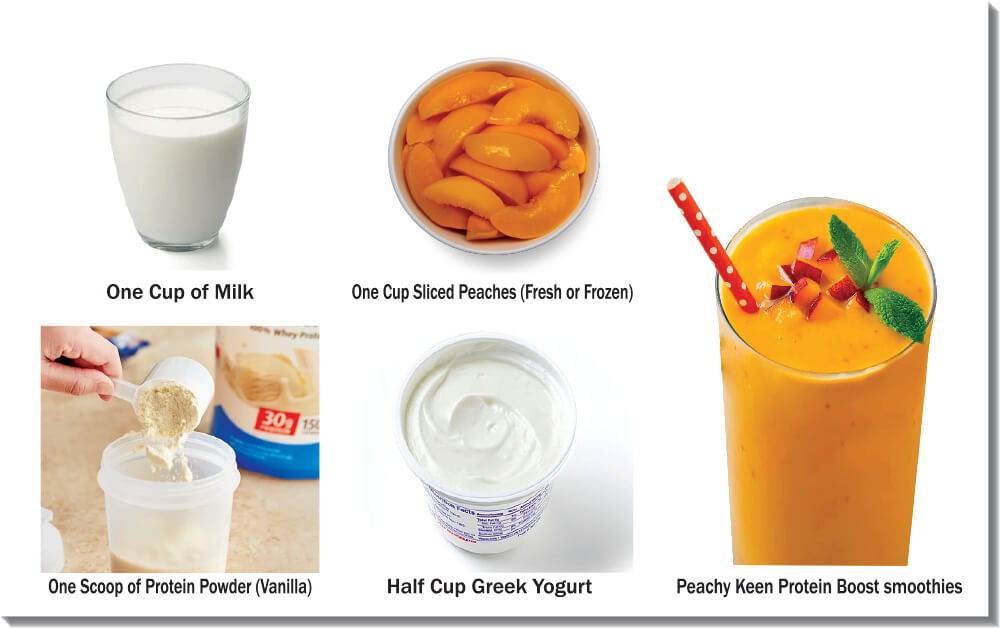
Ingredients:
- 1 cup sliced peaches (fresh or frozen)
- 1/2 cup plain Greek yogurt
- 1 scoop of protein powder (vanilla)
- 1 cup of milk
Instructions:
Blend for a protein-packed, peach-flavored treat.
Nutritional value of ingredients
| Sliced Peaches (1 cup): | Plain Greek Yogurt (1/2 cup): | Protein Powder (1 scoop, vanilla): | Milk (1 cup): |
| Calories: 60 | Calories: 80–100 | Calories: 100 | Calories: 80–100 |
| Carbohydrates: 15g | Protein: 12g | Protein: 20g | Protein: 8g |
| Fiber: 3g | Carbohydrates: 6g | Carbohydrates: 2-5g | Carbohydrates: 12g |
| Sugars: 12g | Fat: 4-5g | Fat: 1-3g | Fat: 2–8 g |
| Vitamin C: 10% of the Recommended Daily Allowance (RDA) | Probiotics are beneficial for gut health. | Other nutrients vary based on the specific protein powder. | Calcium: 300mg |
| Vitamin A: 10% of the RDA |
5. Blueberry Banana Oat Delight: (2 minutes)
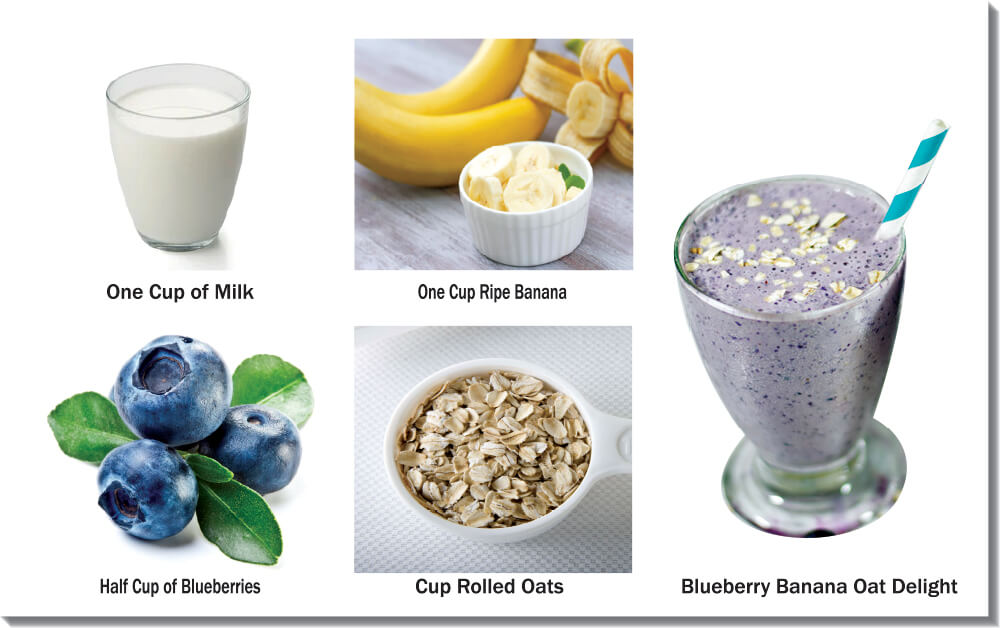
Ingredients:
- 1/2 cup of blueberries
- 1 ripe banana
- 1/4 cup rolled oats
- 1 cup of milk
Instructions:
Blend until smooth. This recipe adds a wholesome touch with oats.
Nutritional value of ingredients
| Blueberries (1/2 cup): | Ripe Banana: | Rolled Oats (1/4 cup): | Milk (1 cup): |
| Calories: 40 | Calories: 105 | Calories: 80 | Calories: 80–100 |
| Carbohydrates: 10g | Carbohydrates: 27g | Carbohydrates: 14g | Protein: 8g |
| Fiber: 2g | Fiber: 3g | Fiber: 2g | Carbohydrates: 12g |
| Sugars: 7g | Sugars: 14g | Protein: 3g | Fat: 2–8 g |
| Vitamin C: 10% of the Recommended Daily Allowance (RDA) | Vitamin C: 10% of the RDA | Fat: 1.5g | Calcium: 300mg |
| Antioxidants: Various, including anthocyanins | Potassium: 450mg |
Fruit smoothie recipes with milk for weight loss
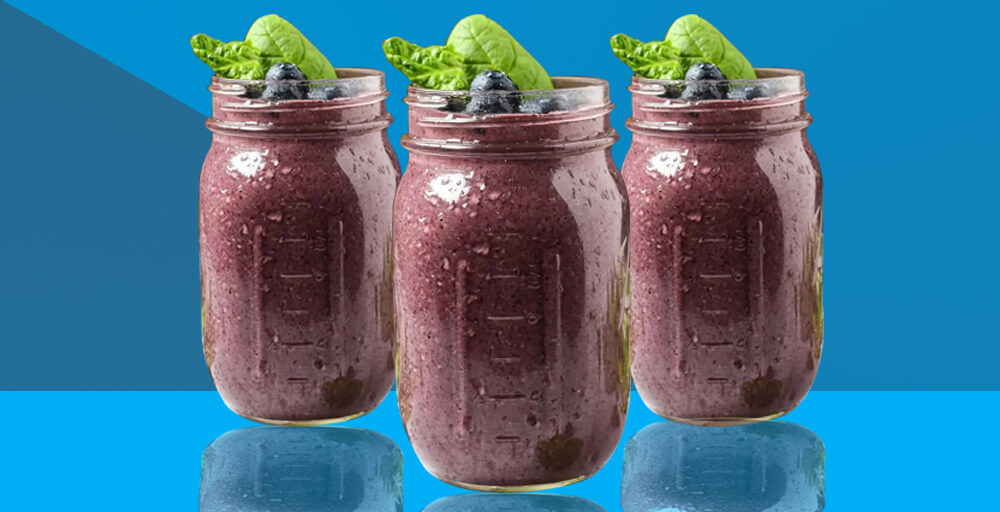
Fruit smoothies with milk can indeed be a valuable addition to a weight-loss journey when incorporated mindfully. Here are some tips and considerations for crafting weight-loss-friendly fruit smoothie recipes with milk:
Opt for low-fat milk:
Choose low-fat or skim milk to reduce your overall calorie and fat intake. This ensures you get the nutritional benefits of milk without excessive calories.
Incorporate Protein:
Protein is crucial for weight loss as it helps control hunger and supports muscle maintenance. Add sources of protein, like Greek yogurt, protein powder, or cottage cheese, to your smoothie.
Choose fruits with less sugar:
While fruits are naturally sweet and contribute essential nutrients, choose fruits that are low in sugar. Such fruits as raspberries, berries, blueberries, and strawberries can be kept on your favorite list.
Include fiber-rich ingredients:
Fiber aids in satiety and digestive health. Incorporate ingredients like chia seeds, flaxseeds, or oats to boost the fiber content of your smoothie.
Limit added sweeteners:
Minimize the use of added sugars or sweeteners. Let the natural sweetness of fruits and a touch of honey or maple syrup suffice, keeping your smoothie lower in overall sugar content.
Size of the control part:
Be careful about portion sizes to manage your calorie intake. Although smoothies can be nutritious, consuming too much can contribute to a calorie surplus.
Include green vegetables:
Include nutrient-dense, low-calorie vegetables like spinach or kale. Since they are very low in calories, the body does not gain weight.
Mindful Ingredient Combinations:
Combine ingredients strategically for a balance of macronutrients. The combination of protein, healthy fats, and complex carbohydrates can create a satisfying and nourishing smoothie.
Consider Meal Replacement:
Smoothies can serve as a convenient and nutritious meal replacement for those looking to control their calorie intake. Ensure they contain a mix of proteins, fats, and carbohydrates for balanced nutrition.
Hydration is key:
Use water or milk as the liquid base to maintain hydration without adding unnecessary calories. Avoid high-calorie fruit juices or sweetened beverages.
Remember to consult with a healthcare or nutrition professional before making significant changes to your diet, especially if you have specific health concerns or dietary restrictions. Additionally, the key to successful weight loss is a combination of a balanced diet, regular physical activity, and overall lifestyle choices.
Benefits of Fruit Smoothie Recipes with Milk

Nutrient-Rich Goodness:
Fruit smoothies with milk offer a powerhouse of essential nutrients, including vitamins, minerals, and antioxidants, contributing to overall well-being.
Bone Health Support:
The combination of fruits and milk provides a rich source of calcium and vitamin D, supporting bone health and helping prevent osteoporosis.
Gut-Friendly Probiotics:
Incorporating yogurt or kefir in your smoothie introduces probiotics, promoting a healthy gut microbiome and aiding digestion.
Sustained Energy Release:
The natural sugars in fruits, coupled with the protein and fats in milk, create a balanced blend for sustained energy release throughout the day.
Hydration Boost:
With water content from fruits and milk, these smoothies contribute to hydration, which is crucial for skin health and overall bodily functions.
Weight Management Aid:
The fiber in fruits, combined with the satiating effect of milk, helps control appetite, supporting those on a weight management journey.
Post-Workout Recovery:
The protein content in milk assists in muscle repair, making fruit smoothies an ideal post-workout recovery option for fitness enthusiasts.
Heart-Healthy Goodness:
Antioxidants and potassium found in fruits contribute to heart health, and the inclusion of low-fat milk supports a heart-friendly diet.
Boosted Immunity:
Vitamins like C and A from fruits, along with the immune-boosting properties of milk, create a potent combination for enhanced immune function.
Convenient Nutrition:
Fruit smoothies with milk offer a convenient way to consume a variety of nutrients in a single, delicious serving, making healthy eating enjoyable and accessible.
Best Blender for Fruit Smoothie Recipes with Milk
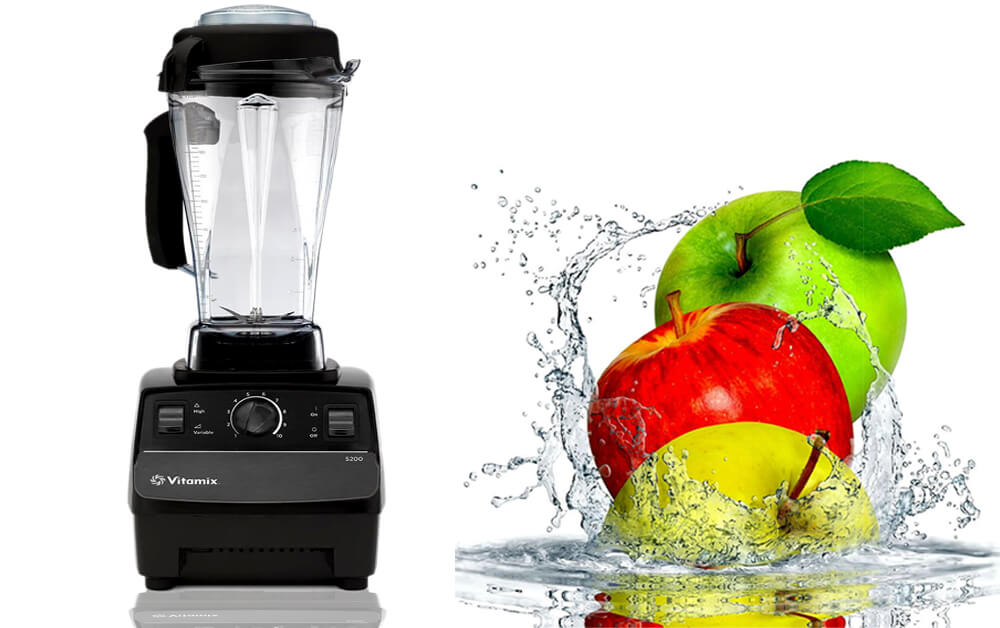
Vitamix 5200 Blender:
Key Features: powerful 1380-watt motor, variable speed control, and aircraft-grade stainless steel blades.
Benefits: The high-speed motor and sharp blades effortlessly blend fruits and milk into smooth, creamy textures. Variable speed control allows precision for various recipes.
Ninja Professional BL610 Blender:
Key Features: 1000-watt motor, total crushing blades, and multiple speeds.
Benefits: The Ninja BL610’s powerful motor and Total Crushing blades are excellent for breaking down fruits and achieving a smooth consistency with milk. The multiple speed settings provide versatility.
Blendtec Designer 625 Blender:
Key Features: 1560-watt motor, blunt safety blade, and pre-programmed cycles.
Benefits: The Blendtec Designer 625’s powerful motor and blunt safety blade ensure efficient blending of fruits with milk. Pre-programmed cycles simplify the blending process, delivering consistent results.
Frequently Asked Questions: Fruit Smoothie Recipes with Milk
1. Can I use any type of fruit smoothie recipes with milk?
Certainly! Fruit smoothie recipes are versatile and can be customized based on your dietary preferences. Whether you prefer dairy or plant-based options, you can use regular milk, almond milk, soy milk, or any other milk substitute. Experiment with different kinds to find the one that suits your taste and nutritional requirements.
2. How do fruit smoothie recipes with milk contribute to a healthy diet?
Fruit smoothies with milk offer a myriad of health benefits. They are packed with essential vitamins, minerals, and antioxidants from fruits, while the milk provides a source of protein, calcium, and vitamin D. This nutrient-rich combination supports bone health, boosts the immune system, and provides sustained energy throughout the day.
3. Can I include yogurt in my fruit smoothie for added benefits?
Absolutely! Yogurt is a fantastic addition to fruit smoothies with milk. It not only enhances the creaminess but also introduces probiotics, promoting a healthy gut. The probiotics in yogurt contribute to improved digestion and can positively impact overall digestive health.
4. Are fruit smoothies with milk suitable for weight management?
Yes, fruit smoothies with milk can be a valuable part of a weight management plan. The fiber content in fruits, combined with the protein and healthy fats in milk, helps control appetite and keeps you feeling satisfied. Additionally, these smoothies can be a nutritious alternative to high-calorie snacks, supporting your weight-management goals.
5. Can I make fruit smoothies with milk ahead of time?
Absolutely! While the freshest taste is achieved when consumed immediately, you can prepare fruit smoothies with milk ahead of time. Consider using frozen fruits or adding ice cubes to help maintain the desired consistency. Store them in airtight containers in the refrigerator for up to 24 hours, giving you a convenient and nutritious option for busy mornings or quick snacks throughout the day.
Conclusion
In conclusion, integrating fruit smoothie recipes with milk into your routine can be a delectable and nutritious step towards a healthier lifestyle. Packed with essential nutrients, these smoothies, featuring keywords like weight loss, offer a delightful blend of flavors while supporting overall well-being. By carefully selecting low-fat milk, incorporating protein sources, and making mindful ingredient choices, these smoothies become a versatile ally for those on a weight loss journey. Embrace the delicious synergy of fruits and milk, fostering a habit that not only tantalizes the taste buds but also contributes to a balanced and satisfying approach to achieving health and fitness goals.

